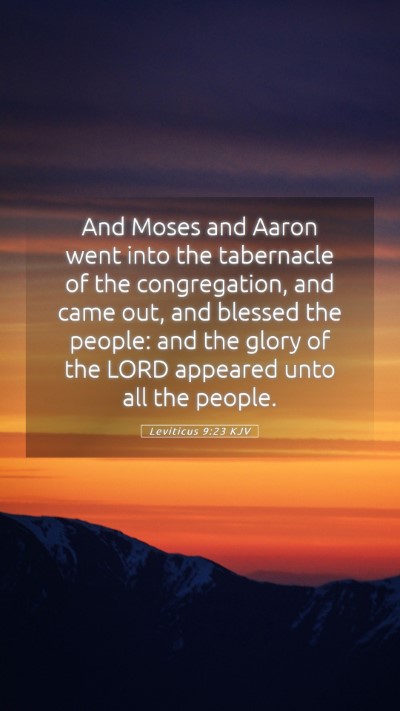Understanding Leviticus 9:23: Insights and Interpretations
Leviticus 9:23 states: "And Moses and Aaron went into the tabernacle of the congregation, and came out, and blessed the people: and the glory of the LORD appeared unto all the people." This verse is pivotal in the context of the consecration of the priesthood and highlights themes of divine presence, blessing, and worship within the Israelite community.
Key Themes of Leviticus 9:23
- Divine Presence: The appearance of God's glory signifies His approval and presence among His people.
- Covenantal Blessings: The act of blessing the people demonstrates the responsibility of the priesthood to mediate God's grace.
- Worship and Holiness: This event emphasizes the importance of holiness and the proper approach to God's presence.
Bible Verse Meanings
According to Matthew Henry, the appearance of God's glory after the sacrifices indicates that the worship was accepted and that God was pleased with their efforts. It confirms that God's presence is the heart of corporate worship, an idea echoed in various scripture analysis practices.
Albert Barnes adds that the act of blessing reflects a crucial duty of the high priest, who not only leads the people in worship but also represents them before God. This highlight of the priestly role is essential for understanding scripture interpretation related to the Old Testament priesthood.
Adam Clarke points out that the blessing is a joyous event, signifying God’s favor resting upon the community. This scene sets the stage for future worship practices and illustrates the deep connection between divine approval and the act of communal worship.
In-Depth Analysis of Leviticus 9:23
Understanding the Context
To fully grasp the meaning of Leviticus 9:23, one must consider its contextual background. This verse occurs after the inauguration of the Aaronic priesthood and the initiation of the sacrificial system. This framework is integral to understanding the significance of their actions.
The Role of Moses and Aaron
Moses and Aaron’s entrance into the tabernacle symbolizes a profound moment of intercession and communal representation. As representatives of the people, their actions illustrate the vital link between God and His people during worship. The collective experience of divine glory further reinforces the idea that God desires to dwell among His people.
Theological Implications
The theological implications of this verse extend towards understanding God's nature as relational and covenantal. His glory not only reassures His people of His presence but also reaffirms the unique relationship established through the covenant. This verse serves as a reminder that worship is a response to divine revelation.
Application of Leviticus 9:23 in Daily Life
In applying the lessons from Leviticus 9:23 to our daily lives, one can reflect on the importance of seeking God's presence in communal worship. In modern congregations, this echoes the significance of preparing one’s heart before entering a place of worship.
Moreover, it highlights the role of spiritual leaders who serve as mediators, guiding congregations towards a deeper understanding of God’s work and blessing. Understanding scripture helps believers to appreciate the enduring principles of worship and connection to God.
Cross References
- Exodus 39:43: This verse reflects God's approval of the offerings made.
- 2 Chronicles 5:14: The glory of the Lord fills the temple after worship.
- Hebrews 9:6-7: Discusses the priest's role and access to God.
- Psalm 67:1: A prayer for God's blessing and presence among the people.
- John 1:14: Referring to the glory of God dwelling among humanity through Christ.
Conclusion
In summary, Leviticus 9:23 serves as a profound reminder of the significance of God's glory in the life of believers. By understanding scripture, engaging in biblical exegesis, and applying these principles, one can cultivate a richer spiritual life that honors the covenant relationship established through worship.
Whether studying alone or in Bible study groups, reflecting on verses like Leviticus 9:23 can deepen one’s relationship with God and enrich biblical understanding, fostering an environment where His glory is sought and celebrated.


